Launch of a Climate-Health Observatory Accelerator program during the Pasteur Network Climate and Health Convening
(Dakar, June 4-5, 2024)
On June 4-5 in Dakar Senegal, 60+ participants, including members of the Pasteur Network and external experts met to discuss how the Pasteur Network can help address the growing impact of climate change on global health, fostering collaborative research and innovative solutions to mitigate emerging health threats and improve public health resilience
The event was supported by The Rockefeller Foundation and the HKJC Institute of Philanthropy who are funding the Pasteur Network’s new Climate-Health Observatory Accelerator program which aims to:
- Create foundations for C-H observatories through global network of Fellows.
This fellowship program is a unique opportunity designed for members in Low and Middle-Income Countries (LMICs) to empower researchers to provide support to local stakeholders in making informed decisions with regards to climate and health. - Advance generalizable tools and practices through Pasteur Network Exemplars
Exemplar members of the Pasteur Network will share their knowledge and expertise in climate and health and help to guide the fellowship cohort in their region - Scale impact through shared knowledge via Global Goods and an internal knowledge sharing platform. The 2-day event in Dakar focused on the Accelerator project in more detail, including break-out discussion sessions specifically on the fellowship program design and development of global goods.
Global experts also presented and facilitated discussion on various topics such as updates on the progress of the Pandemic Treaty (Dr. Maria de Lourdes Aguiar Oliveira from FioCruz), important trends and considerations for integrating climate aspects into health surveillance efforts (Dr. Linda Venczel from PATH), connecting climate-health recommendations with policy and investment decisions for government stakeholders (Mr. Jackson Kimani from Climate Action Platform for Africa-CAP-A), showcase of the WHO HIVE collaboration platform (Mr. Brian Yau from WHO), and a round table discussion on the development and dissemination of global goods (Dr. Cristina Tato from Chan Zuckerberg Biohub, Mr. Gaurav Godhwani from Civic Data Lab, and Dr. Felipe Colón-González from Wellcome Trust)
The convening was also an important celebration of Institut Pasteur de Dakar’s 100th anniversary, including a tour of the institute and a celebration cocktail. Celebrating IP Dakar’s 100th anniversary marks a century of pioneering research, innovation, and contributions to global health, reinforcing its vital role in combating infectious diseases and improving public health worldwide The Pasteur Network extends its heartfelt gratitude to the Rockefeller Foundation and the Institute of Philanthropy for their generous support, which made the meeting in Dakar on June 4-5th possible. We also wish to thank all the participants for their invaluable contributions and engagement, which were instrumental in advancing our discussions on the critical intersection of climate and health.
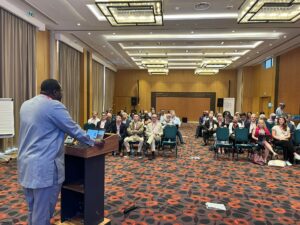
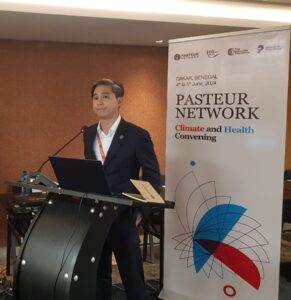
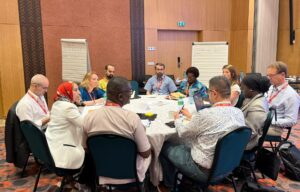
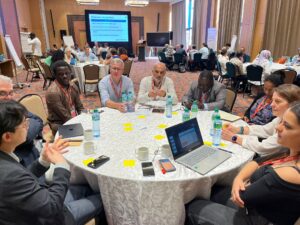
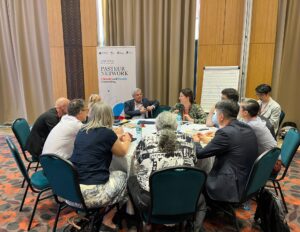
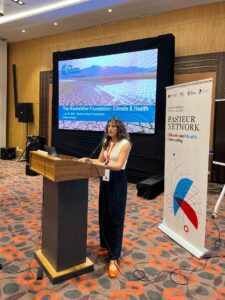
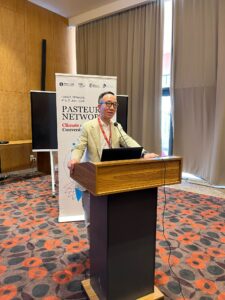
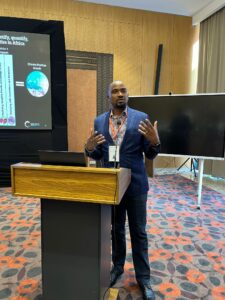
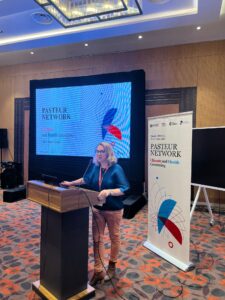
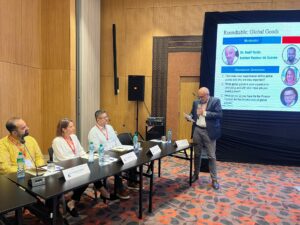
The Centre for Africa’s Resilience to Epidemics (CARE) was inaugurated on January 19th, 2024, by Institut Pasteur de Dakar, a Pasteur Network member, in the presence of various dignitaries and partners. The opening of this center also marked the beginning of Institut Pasteur de Dakar’s centenary celebrations in 2024.
CARE’s objectives are
- to train the next generation of leaders, decision-makers and actors involved on epidemic fronts
- Promote disease intelligence by collecting, storing and analyzing massive epidemiological data
- Translate epidemiological research into social value by fostering a culture of innovation and entrepreneurship
CARE is also an instrument in the battle against epidemics, consistent with the Institut Pasteur de Dakar’s strategic objective on epidemic preparation, which it shares with the other Pasteur Network members.
On this occasion, the Africa CDC formally certified Institut Pasteur de Dakar as a Center of Excellence in Biosafety and Biosecurity for the West African Region (RCoeEBBS).
Review of the event




- To find out more, read the statement from Institut Pasteur in Dakar.
Six young graduates from the Pasteur Network were honored at the Institut Pasteur’s PhD graduation ceremony on December 8, 2023 in Paris.
This celebration marked the end of a chapter for this new generation of researchers and highlighted the excellence of the growing young scientific community trained at the Institut Pasteur, a Pasteur Network member.
This celebration, organized by the Institut Pasteur’s Education Department since 2013, marked its 11th anniversary, highlighting the scientific excellence of the Institut Pasteur’s young scientist community.
Chaired by Monica Sala, Director of the Education Department and Vincenzo di Bartolo, Head of the graduation ceremony organization team, this edition included an opening address by Valérie Masson-Delmotte, a climatologist, CEA Director of Research and Co-Chair of Working Group I of the Intergovernmental Panel on Climate Change (IPCC) as guest of honor.
She emphasized the intrinsic link between climate change and research, highlighting how the increase in temperature fosters the spread of vector-borne diseases. Hence, pursuing research is crucial in supporting the active response to this urgent matter.
The graduates were introduced by Monica Sala, Director of the Education Department at the Institut Pasteur in Paris and Rebecca Grais, Executive Director of the Pasteur Network. The doctoral students hailed from all four regions of the Pasteur Network – Africa, Americas, Asia-Pacific, Euro-Mediterranean – and had the opportunity to work on a wide variety of topics as detailed below. They all chose to share a quote that inspires them.
- Elliot Fara Nandrasana Rakotomanana

PhD in social and cultural anthropology, University of Bordeaux (France)
Institut Pasteur de Madagascar/Epidemiology and Clinical Research Unit
Thesis: Stunting and the risk of contamination by the living environment. An anthropology of early childhood through the prism of spatial and social organizations in a disadvantaged neighborhood in Antananarivo (Madagascar)
“Do not stop! With passion, courage and determination, we can overcome fear, sadness… progress and can break the barrier to success.”
Elliot Rakotomanana earned a postgraduate degree (DEA) in Biochemistry applied to nutrition from the University of Antananarivo (Madagascar) in 2006. He joined the Institut Pasteur de Madagascar (IPM) within the Epidemiology and Clinical Research Unit as national coordinator of a socio-anthropological study on stunting in 2014. Passionate about anthropology, in 2016 he embarked on studies in this discipline at the University of Bordeaux through the AFRIBIOTA project, a multidisciplinary research program within the Pasteur Network addressing pediatric environmental enteropathy and stunting. He completed a master’s degree in September 2017 and defended his doctoral thesis under the supervision of Prof. Marc-Eric Gruénais (Bordeaux University) and Dr. Tamara Giles-Vernick (Institut Pasteur) in January 2023. He reveals the broad processes underlying the resource-poor neighborhoods of Antananarivo and the inability of local inhabitants to manage waste, drawing on history, political science and geography. His approach is original; instead of asking why children are malnourished and experience stunting, he demonstrates why and how certain children can avoid it. Since 2018, he has been the deputy head of the “Health & Social Sciences” team at IPM.
- Amina Gihbid
Assistant professor at the High Institute of Nursing Professions and Health Techniques (ISPITS), Morocco & Associate member of the Oncovirology Laboratory, Institut Pasteur du Maroc
Thesis: Evaluation of viral, genetic and metabolic prognosis biomarkers for nasopharyngeal cancer
“That man can have nothing but what he strives for (39); That (the fruit of) his striving will soon come in sight (40); Then will he be rewarded with a reward complete (41).” Surat An-Najm (The Star), Quran

Amina Gihbid holds a PhD in Virology and Molecular Biology. Her research was conducted in the Oncovirology Laboratory at the Institut Pasteur du Maroc (IPM) and Faculty of Science Ain-Chock Casablanca – Morocco. It was mainly focused on the assessment and identification of potential viral, genetic and metabolic biomarkers that could predict early treatment outcomes in patients with nasopharyngeal carcinoma (NPC) and improve the prognosis of this particularly prevalent malignancy in Morocco. The findings of her research highlighted circulating Epstein-Barr virus (EBV) DNA viral load, along with metabolic parameters derived from [18F] FDG PET/CT scan as promising prognostic biomarkers in the clinical management of NPC. These biomarkers could therefore help to personalize patient treatment according to the risk of relapse and recurrence.
At IPM, she is currently working on two ongoing projects, one focusing on characterization of the epidemiological-genetic architecture of breast cancer in North Africa: therapeutic and socio-economic impact, and the second project pertaining to Personalized Medicine in North Africa (PerMediNA). She is also involved in studies conducted within IPM’s Oncovirology Laboratory, investigating the viral etiology of oropharyngeal carcinoma and breast cancer in Morocco.

Transversal activities in Applied Genomics at Sciensano, Belgium
Thesis: Exploring the added value of Whole Genome Sequencing in routine and pandemic viral surveillance
“The essence of a successful PhD lies in the ability to evolve and align research with an ever-changing world.”
Laura Van Poelvoorde earned her Master of Science in industrial engineering with a focus on biochemistry from the University of Ghent in 2017. Her interest in research and public health led her to the WIV-ISP (Scientific Institute of Public Health, now part of Sciensano) as a PhD researcher within the “Transversal Activities in Applied Genomics” department under the supervision of Nancy Roosens (Sciensano) and Xavier Saelens (Ghent University). Her PhD research focused on innovative strategies to improve the surveillance of influenza which led to exploring whole genome sequencing and analysis. This experience was extended to SARS-CoV-2 in wastewater surveillance. These studies led to a PhD in Biochemistry and Biotechnology in January 2023 and to 10 peer-reviewed publications on genomic strategies that contribute to improving respiratory virus surveillance for the benefit of society. After graduating, Laura Van Poelvoorde secured a permanent position at Sciensano focused on developing methods for pathogen detection in wastewater.
- Irini Thanou
Laboratory of Stem Cells and Neuroimaging / Neurobiology Department, Hellenic Pasteur Institute, Greece
Thesis: Exploring the Brain’s Response to Chemotherapy: Neurogenesis at the Forefront
“Ever tried. Ever failed. No matter. Try again. Fail again. Fail better,” S. Beckett

Irini Thanou’s academic journey in neurobiology has centered on understanding the intricate dynamics of adult neurogenic niches in both homeostasis and pathology. During her PhD research, she unveiled novel migratory routes of neural progenitors in response to chemotherapeutic agents, shedding light on the dynamic interplay of instinct and extrinsic cues regulating neurogenic regions and adjacent brain parenchyma. Exploring the brain’s regenerative capacity in response to pathology, she contributed to a published project using neurogenic microRNAs and small molecules for the direct reprogramming of astrocytes into functional neurons. The Institut Pasteur has played a pivotal role in shaping her research. Collaborative initiatives within the network allowed her to engage in projects investigating Alzheimer’s disease (AD) risk factors in brain homeostasis, providing valuable insights into the emerging role of neuroinflammation as a driving factor in AD. She also actively participated in a study on dynamic interactions between astrocytes and microglia during neuroinflammation, employing cutting-edge intravital brain imaging techniques. She aspires her next scientific chapter to be even more captivating.
- Beatriz Chaves

DTI-CNPq research fellow, Oswaldo Cruz Foundation (Fiocruz) – Laboratory on Thymus Research (LPT)
Thesis: Anti-VLA-4 antibodies for multiple sclerosis treatment: rational design and study of their mechanisms of action by high-content cell imaging
“Everything that challenges me makes me feel alive.”
Beatriz Chaves is a biotechnologist with experience in T-cell biology and antibody development. She has a bachelor’s degree in Biotechnology (UFC – Fortaleza, Brazil), a master’s degree in Cell and Molecular Biology (Fiocruz – Rio de Janeiro, Brazil) and a PhD in Biotechnology and Health/Computational and Systems Biology (Fiocruz/INFINITy-INSERM – Eusébio/Rio de Janeiro/Toulouse, Brazil/France). During her academic journey, she worked on the in silico design, production and functional evaluation of antibodies targeting Very Late Antigen 4 (VLA-4) for Multiple Sclerosis (MS) treatment. Throughout her PhD, she investigated the morphological profiling of MS patients’ lymphocytes by high-content cell imaging to determine their clinical response to the current antibody-based anti-VLA-4 therapy. The research, collaborations and scientific skills developed by Beatriz in her academic career have so far resulted in one patent; five published, one accepted and two ongoing papers; and three awards won at conferences. Beatriz’s current research goals include gaining a better understanding of the role of T-cells in MS pathogenesis and improving current immunotherapies for chronic diseases.
- Noé Ochida
Institut Pasteur de Nouvelle-Calédonie
Institut Pasteur Paris, Mathematical Modeling of Infectious Diseases Unit
Thesis: Modeling the dynamics of COVID-19, dengue, and the establishment of Wolbachia in Aedes aegypti populations in New Caledonia / Theme: Infectious diseases modeling
“A great adventure with quite a few twists along the way and many joys”
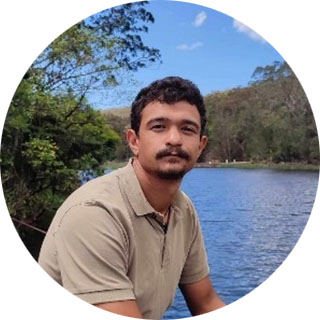
Noé Ochida from New Caledonia graduated from Montpellier University with a bachelor’s degree in microbiology. For his master’s degree, he shifted from the microscopic scale to study the ecology of infectious diseases. Recognizing the impact of dengue in New Caledonia, he pursued an M2 internship at the Institut Pasteur de Nouvelle-Calédonie (IPNC) to work on a public health issue in his homeland. This opportunity led him to a PhD at IPNC in collaboration with the IRD on modeling dengue dynamics and the establishment of Wolbachia in Aedes aegypti populations in New Caledonia. His research focused on present and future climate risk of dengue outbreaks in New Caledonia using downscaled climate projections of global climate models. He also modeled Wolbachia strategy deployment in Nouméa, suggesting optimal release strategies and assessing its impact on dengue transmission. He had the opportunity to provide modeling support to decision makers during the COVID-19 crisis in New Caledonia. He is currently in a postdoctoral research role at the Mathematical Modeling of Infectious Diseases Unit led by Prof. Simon Cauchemez at the Institut Pasteur in Paris.
During the Opening Ceremony of the Pasteur Network Annual Meeting 2023 on November 19th in Tunis, Dr. Ngu Abanda, a scientist from the Centre Pasteur in Cameroon received the Pasteur Network Talent Award 2023 from Stewart Cole, President of the Pasteur Network Foundation and President of the Institut Pasteur. The Talent Awards support the career development of young scientists to become future leaders within the Pasteur Network.
Dr Ngu Abanda obtained his Ph.D. in Tropical Medicine from the University of Hawaii in 2017. During his Ph.D. studies, he conducted research on factors contributing to poor treatment outcomes among Tuberculosis patients, especially children. He also evaluated the accuracy of new rapid molecular-based assays for the diagnosis of drug-resistant Tuberculosis.
Later on, Dr Ngu Abanda, to broaden his knowledge on the clinical diagnosis of infectious diseases, took up the position of microbiologist at the Public Health Laboratory of the Texas Department of State Health Services (USA). He contributed to set up a new molecular assay to detect Candida auris, an emerging fungal pathogen that is associated with nosocomial infections and considered a serious global health threat. During this postdoctoral period, he acquired solid experience in clinical diagnosis of infectious diseases. He joined the Pasteur Center in Cameroon (CPC) in 2020, first as a temporary laboratory scientist with primary activity to lead a team working 24 hours/7 days on COVID-19 diagnosis.
“Dr Ngu Abanda made a significant contribution to CPC’s COVID-19 diagnostic activities and became a research scientist at CPC with primary mission to develop arbovirus research activities. He now leads the WHO yellow fever regional reference laboratory (RRL) and the arbovirology laboratory at CPC” explained Mirdad Kazanji, Director of the Centre Pasteur in Cameroun.
His current research activities focus on the long-term immunity of the yellow fever vaccine, and the epidemiological and entomological surveillance of arboviruses.
”Providing affordable and quality assured diagnosis to inform vector-borne diseases control and prevention programs is the central tenet of our activities.” Dr Ngu Abanda
His long-term goal is to develop a comprehensive and multidisciplinary research and training program on arboviruses thanks to its daily investment alongside the CPC teams.
“Eleven brilliant young scientists of the Pasteur Network have already received this prize and are still contributing in an excellent way to the scientific excellence of the Pasteur Network. Today, we are honored to reward the quality of the first achievements made by Dr Ngu Abanda and to support his career and its further ambitious developments” underlined Stewart Cole, President of the Pasteur Network Foundation and President of the Institut Pasteur.
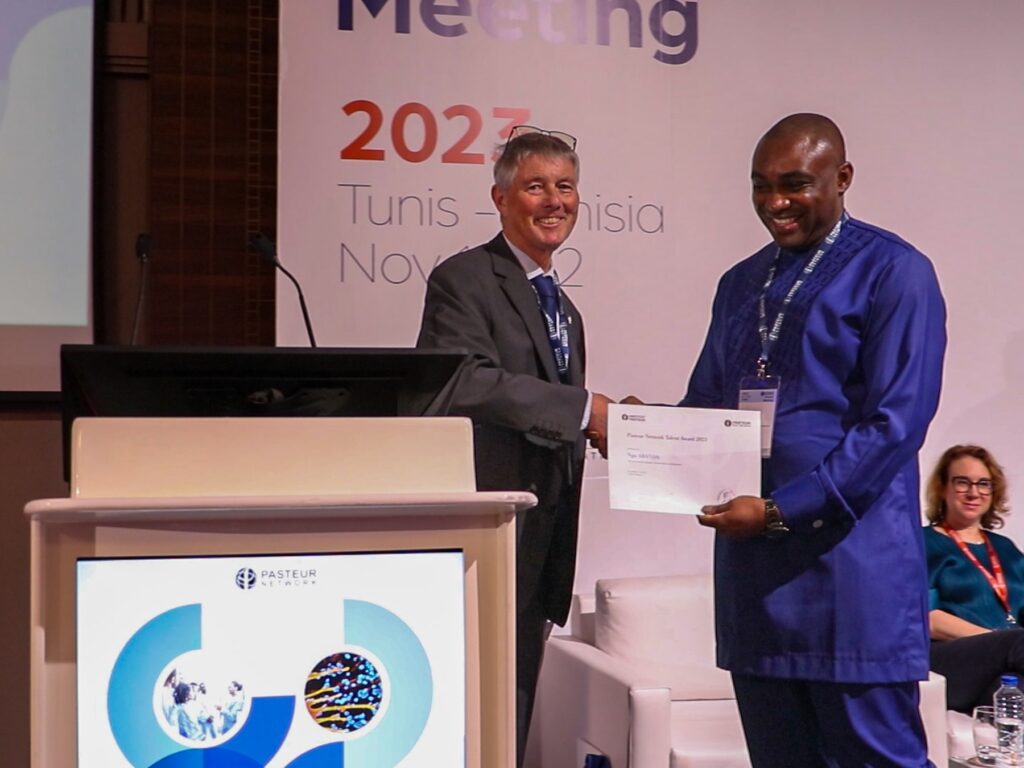
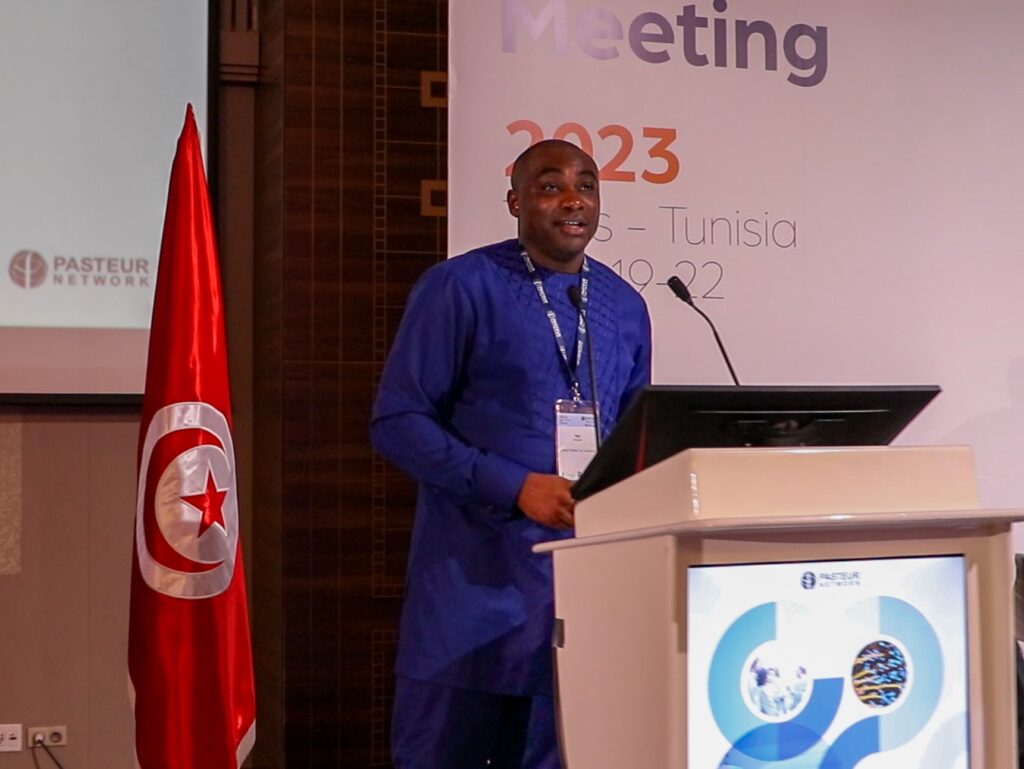
Pasteur Network announces the online publication of the report, which covers the 2021-2022 activities.
This latest report includes a presentation of the network and worldwide highlights of its members, achievements, and community.
Each of the four chapters is dedicated to a Pasteur Network Region: Africa, Americas, Asia-Pacific and Euro-Mediterranean with a specific page for each member.
About the Pasteur Network
The Pasteur Network is a vast human and scientific community with more than 30 members in over 20 countries contributing together to global health. Located in the heart of endemic areas, the Network has privileged access to a large number of pathogens that it monitors and studies on all five continents. This exceptional diversity makes the Pasteur Network a unique global actor in public health, science, innovation, and education, especially in the fight against infectious diseases.
The Pasteur Network aims to promote collaboration and knowledge sharing by sponsoring yearly high-level training modules . Three recent courses hosted by members of the Pasteur Network addressed some of its main action pillars : epidemic intelligence and preparedness, research, development and innovation, multi-disciplinary knowledge communities and equitable collaboration.
A first course focused on “Biology of emerging and Neglected Viral Infections in Latin America” took place from April 19th to 28th , 2023 at the Institut Pasteur de Montevideo.
The course, organised by Nicolas Sarute (Institut Pasteur de Montevideo), Nolwenn Jouvenet (Institut Pasteur, Paris) and Sandra Cordo (UBA, AUGM, Argentina), brought together researchers and healthcare professionals from all over Latin America. The main objective of the course was to foster a multidisciplinary exchange on key aspects of the biology of neglected and emerging viruses, with a focus on pathogens with an impact on public health. Topics covered included basic virus research, epidemiology, surveillance, and prevention and control strategies.
This course will bear the name of Professor Otto Pritsch, a recently deceased researcher who played a fundamental role in the consolidation of the agreement signed between the French Cooperation for Latin America, the Association of Universities of the Montevideo Group (AUGM), the Institut Pasteur (Paris) and the Institut Pasteur de Montevideo.
Consult the programme on the Institut Pasteur de Montevideo website
A second course within the context of the SARA (Surveillance of antibiotic resistance in Africa) project, co-financed with FSPi funds of the French Ministry of Europe and Foreign Affairs, was held at the Institut Pasteur de Dakar from May 22nd to 26th, 2023. It was co-coordinated by the group of Sylvain Brisse (Institut Pasteur) and Yakhya Diye (Institut Pasteur de Dakar). This intensive course brought together 21 participants from 9 different African countries. The course focused on the sequencing and bioinformatics analysis of bacterial genomes. It also enabled participants to strengthen their collaborative network and share best practices in antibiotic resistance surveillance.
To find out more about the SARA course: read the article published on Pasteur.fr
Finally, the “Immersion in Innovation and Technology Transfer in Biological Sciences and Public Health” course was held from June 26th to 29th, 2023at the Hellenic Pasteur Institute. Over four days, experts spoke about the importance of technology transfer and innovation in the development and manufacture of innovative medical products.
Consult the programme on the Hellenic Pasteur Institute website
By funding these high-level courses and making them accessible to a wide range of participants, the Pasteur Network aims to foster collective action and knowledge sharing, in emerging infectious diseases, anti-microbial resistance and the promotion of scientific innovation.
More information :
List of the courses supported by the Pasteur Network
Pasteur Network contact : Kathleen VICTOIR kathleen.victoir@pasteur.fr
Photo: SARA course in May 2023 at the Institut Pasteur de Dakar. Copyright: Sylvain Brisse
Pasteur International Unit Fungal Extracellular Vesicles has been created by the Institut Pasteur, FioCruz – Oswaldo Cruz Foundation (Brazil) – two members of the Pasteur Network – and the University of Birmingham (UK). The Pasteur International Joint Research Units are jointly created with two or more research teams, working together within the Pasteur Network.
More information :
- Institut Pasteur article : Creation of the Pasteur International Unit Fungal Extracellular Vesicles
- Fiocruz press release : Fiocruz-Pasteur-Birmingham international unit will investigate fungal diseases
About the Pasteur Network
The Pasteur Network is a vast human and scientific community with more than 30 members in over 20 countries contributing together to global health. Located in the heart of endemic areas, the Network has privileged access to a large number of pathogens that it monitors and studies on all five continents. This exceptional diversity makes the Pasteur Network a unique global actor in public health, science, innovation, and education, especially in the fight against infectious diseases.
On Friday March 31, 2023 at a ceremony in Paris, the Institut Pasteur President, Professor Stewart Cole, and the University of São Paulo (USP) Rector, Carlos Gilberto Carlotti Junior, signed articles of association for the Institut Pasteur in São Paulo, a private non-profit organization under Brazilian law. The mission of the institute, an associate member of the Pasteur Network, is to conduct research in the field of biology that contributes to the development of human health, and to promote outreach, education, innovation and knowledge transfer activities and public health measures.
For more information
Read the press release on the Institut Pasteur’s website: https://www.pasteur.fr/en/press-area/press-documents/institut-pasteur-and-university-sao-paulo-sign-articles-association-establish-institut-pasteur-sao
Photo: Signing ceremony at the Institut Pasteur – © François Gardy – Institut Pasteur


Five members of the Pasteur Network— the Institut Pasteur du Cambodge, the Institut Pasteur de Bangui, the Institut Pasteur de Madagascar, the Institut Pasteur de la Guyane and the Institut Pasteur—have collaboratively published the results of a study on mosquito ribosomal RNA. In addition to the release of 234 complete ribosomal RNA sequences from 33 mosquito species to public databases, the study presents the bioinformatics methodology used to assemble these sequences. The eLife article also assesses the use of ribosomal RNA as a molecular marker for taxonomic and phylogenetic studies on mosquitoes. These findings will facilitate the discovery and monitoring of viruses in all the mosquito species investigated as well as others.
Monitoring virus circulation with RNA sequencing (RNA-seq)
Mosquitoes are known to transmit many pathogenic viruses among humans and animals. Most of these viruses carry genetic information in the form of ribonucleic acid or RNA. By sequencing the RNA found in mosquitoes, a technique known as RNA-seq,
we can identify what viral pathogens are circulating in certain mosquito populations by detecting their RNA genomes. This also allows us to discover potential emerging viral pathogens.
However, the mosquito itself contain plenty of RNA, specifically the RNAs that make up protein-producing machines called ribosomes. This type of RNA is aptly called ribosomal RNA. The hyperabundant presence of ribosomal RNA constitute “background noise”, which can reduce the sensitivity of pathogen detection by masking the sequences of interest, and they need to be removed from the sample. To successfully remove or deplete ribosomal RNA, we need to know its reference sequence.

However, the lack of reference ribosomal RNA sequences for a large majority of mosquito species makes it difficult to perform RNA-seq in these species. Only a few vector species were listed on public databases—a collection of all known genetic sequences for all living things. This gap leads to a neglect of the transmission cycles perpetuated by other mosquito species endemic to more remote environments, which are responsible for the infection of reservoir animals. To allow for virus discovery and monitoring in a wider range of mosquito species, the team expanded the current collection of reference ribosomal RNA sequences.
Employing the collective expertise of the Pasteur Network members
By bringing together their expertise and resources, scientists from the Institut Pasteur du Cambodge, the Institut Pasteur de Bangui, the Institut Pasteur de Madagascar, the Institut Pasteur de la Guyane and the Institut Pasteur, all members of the Pasteur Network, have released a large assemblage of ribosomal RNA sequences to public databases. Using a unique bioinformatics method described in the study, the team was able to assemble the complete ribosomal RNA sequences for all their specimens, even in the presence of contaminating biological material. This genomic resource constitutes a set of 234 complete ribosomal RNA sequences of 33 mosquito species.
The implications of this genomic resource
These novel sequences allow for the physical and computational elimination of interfering ribosomal RNA sequence reads, the aforementioned “background noise”, leading to the detection of target viral genomic RNA at increased sensitivity. In addition, ribosomal RNAs can be used for the molecular identification of the mosquito species under study. The accuracy of molecular identification of mosquito species using ribosomal RNA sequences is comparable to that of the mitochondrial cytochrome c oxidase I gene sequence—the gold standard and current reference in molecular taxonomy. The bioinformatics methodology and sequences resulting from this collaboration will thus help to discover and monitor known and potential new pathogens in a large number of insect species by RNA-seq metagenomics.
For more information:
Ribosomal RNA (rRNA) sequences from 33 globally distributed mosquito species for improved metagenomics and species identification
eLife, janvier 2023.
Cassandra Koh, Lionel Frangeul, Hervé Blanc, Carine Ngoagouni,Sébastien Boyer, Philippe Dussart, Nina Grau, Romain Girod, Jean-Bernard Duchemin and Maria-Carla Saleh.
DOI: 10.7554/eLife.82762 / https://elifesciences.org/articles/82762
A collaborative work between the Institut Pasteur du Cambodge and the Institut Pasteur du Laos, from the Pasteur Network, with the French National Research Institute for Sustainable Development (IRD) and the French Agricultural Research Centre for International Development (Cirad), demonstrates the future impacts of human-induced climate change on public health, This study highlights the threat of a significant increase of mosquito densities, a potential vector for numerous infectious diseases in South-East Asia. This study, carried out in the framework of the Ecomore 2 project, has been published in Environmental Health Perspective.
Dengue is an emerging infectious disease, transmitted by mosquitoes, that is affecting more and more people worldwide. Aedes aegypti and Aedes albopictus, the dengue vectors, are prone to expand due to climate change. Human populations could be increasingly exposed to potential outbreaks. In South-East Asia, where dengue is endemic, data on these mosquitoes were gathered by the entomology units of the Institut Pasteur du Cambodge and the Institut Pasteur du Laos, both members of the Pasteur Network.
Conducted in the framework of Ecomore 2 and other projects, this study relies on data collected by Sébastien Marcombe from the Institut Pasteur du Laos and by Sébastien Boyer at the Institut Pasteur du Camboge, together with other literature data on the occurrence of these two species in South-East Asia.
Data on presence, seasonality, and dynamics of Ae. aegypti & Ae. albopictus were analyzed regarding land-use, topography, and climate. Two IRD research units led the mathematical modelling and spatial analyses, first to model their distribution over the region and, second, to assess the impact of the prospective climatic scenarios (nine CMIP6 climate models) on their future distribution. The results show that, by the end of this century, Ae. aegypti and Ae. albopictus densities will respectively increase up to 46% and 25% in South-East Asia due to predicted temperature growths. Moreover, climate mitigation measures are unlikely to significantly moderate this expansion.
The maps resulting from these models are freely accessible on the Ecomore II Climate Platform. Users of the platform can observe the impact of different climate change models and scenarios on the evolution of the distributions of Aedes populations. These results provide further evidence that human-induced climate changes will impact ecosystems and public health.
For more information:
Predicting the Effects of Climate Change on Dengue Vector Densities in Southeast Asia through Process-Based Modeling
Environmental Health Perspective, December 2022.
Lucas Bonnin*, Annelise Tran, Vincent Herbreteau, Sébastien Marcombe, Sébastien Boyer, Morgan Mangeas, and Christophe Menkes.
*Corresponding author.
https://doi.org/10.1289/EHP11068
Ecomore website: https://ecomore.org/2023/02/02/the-evolution-of-dengue-vectors-densities-faced-with-climate-change-in-south-east-asia/